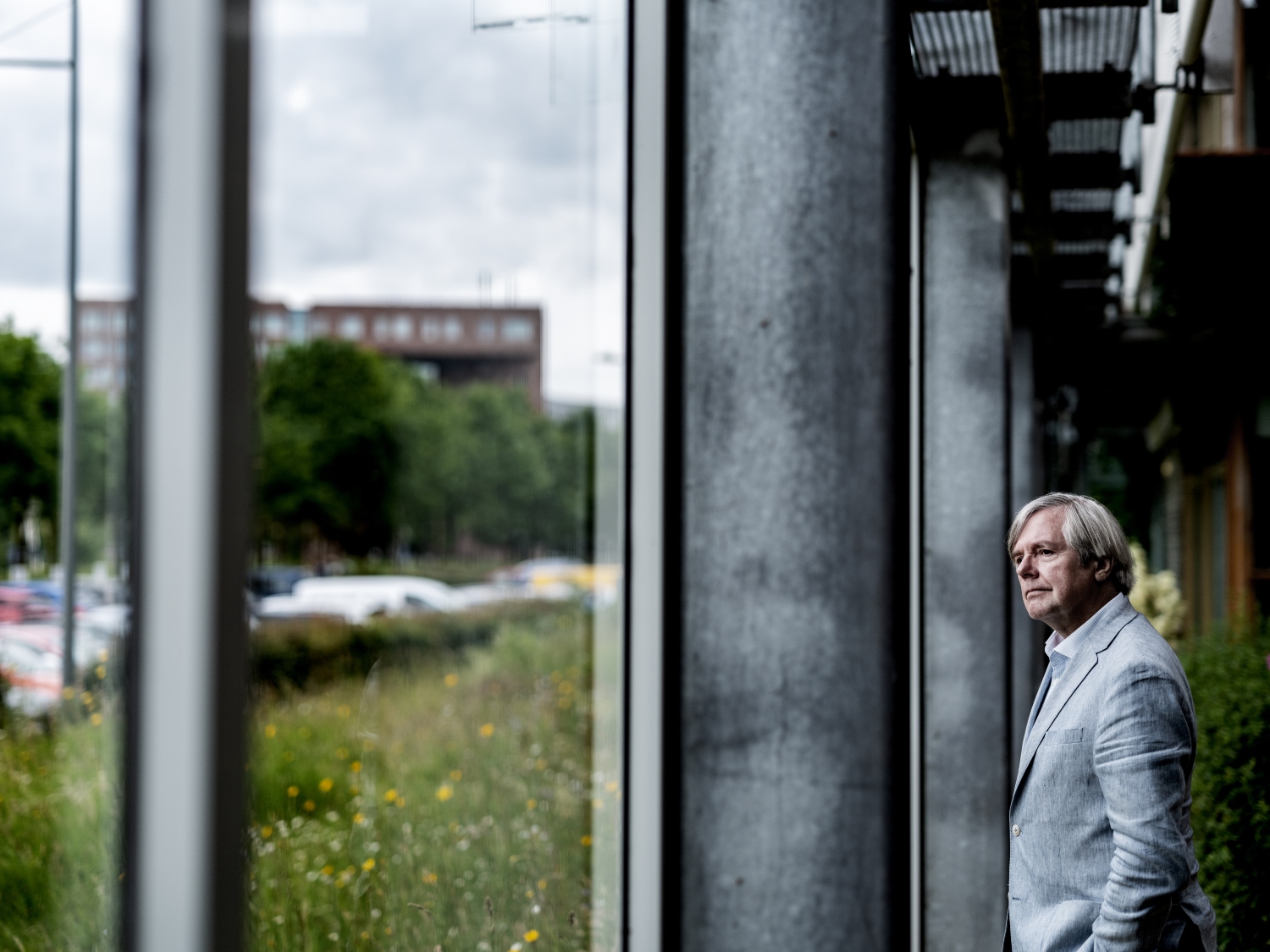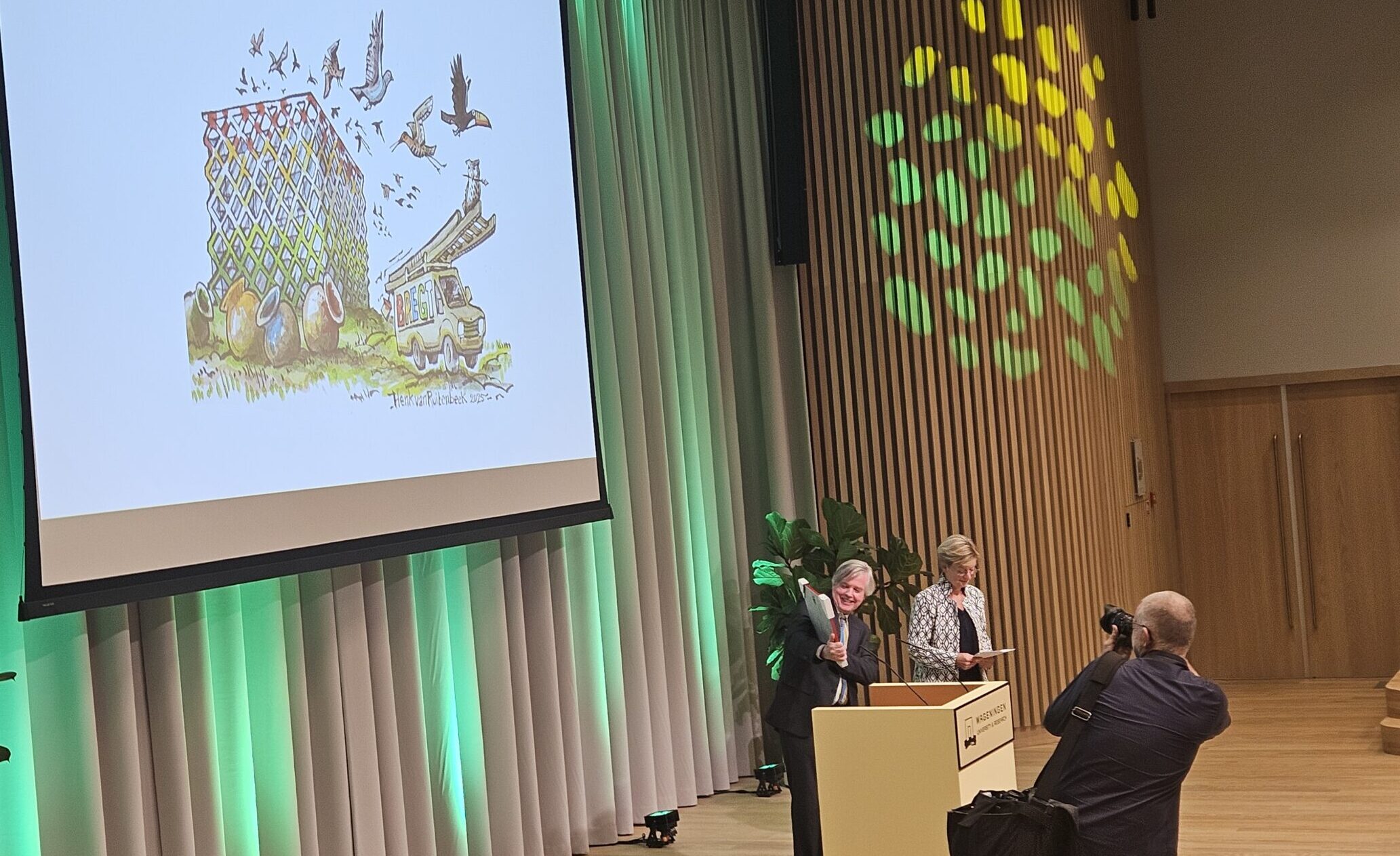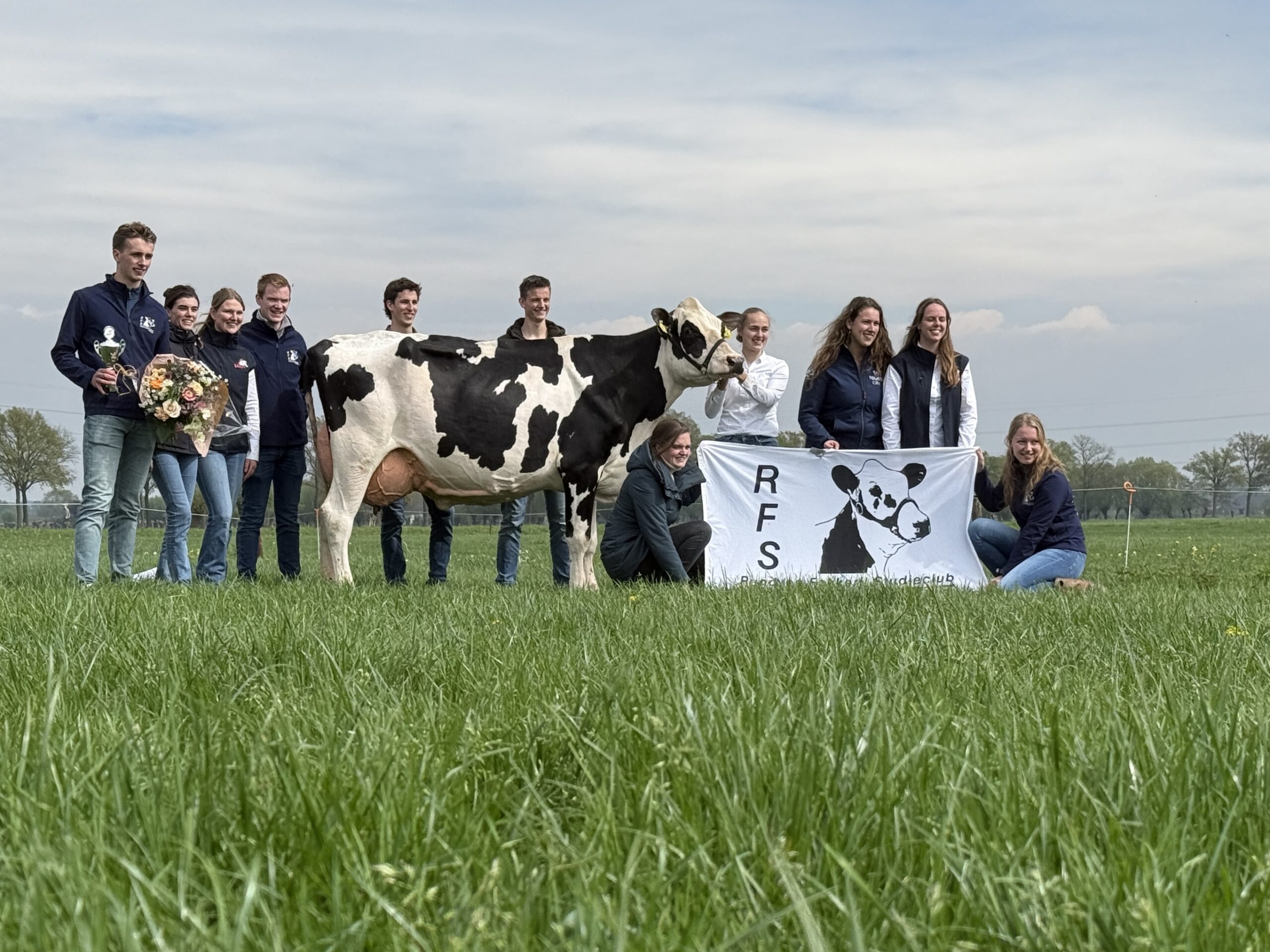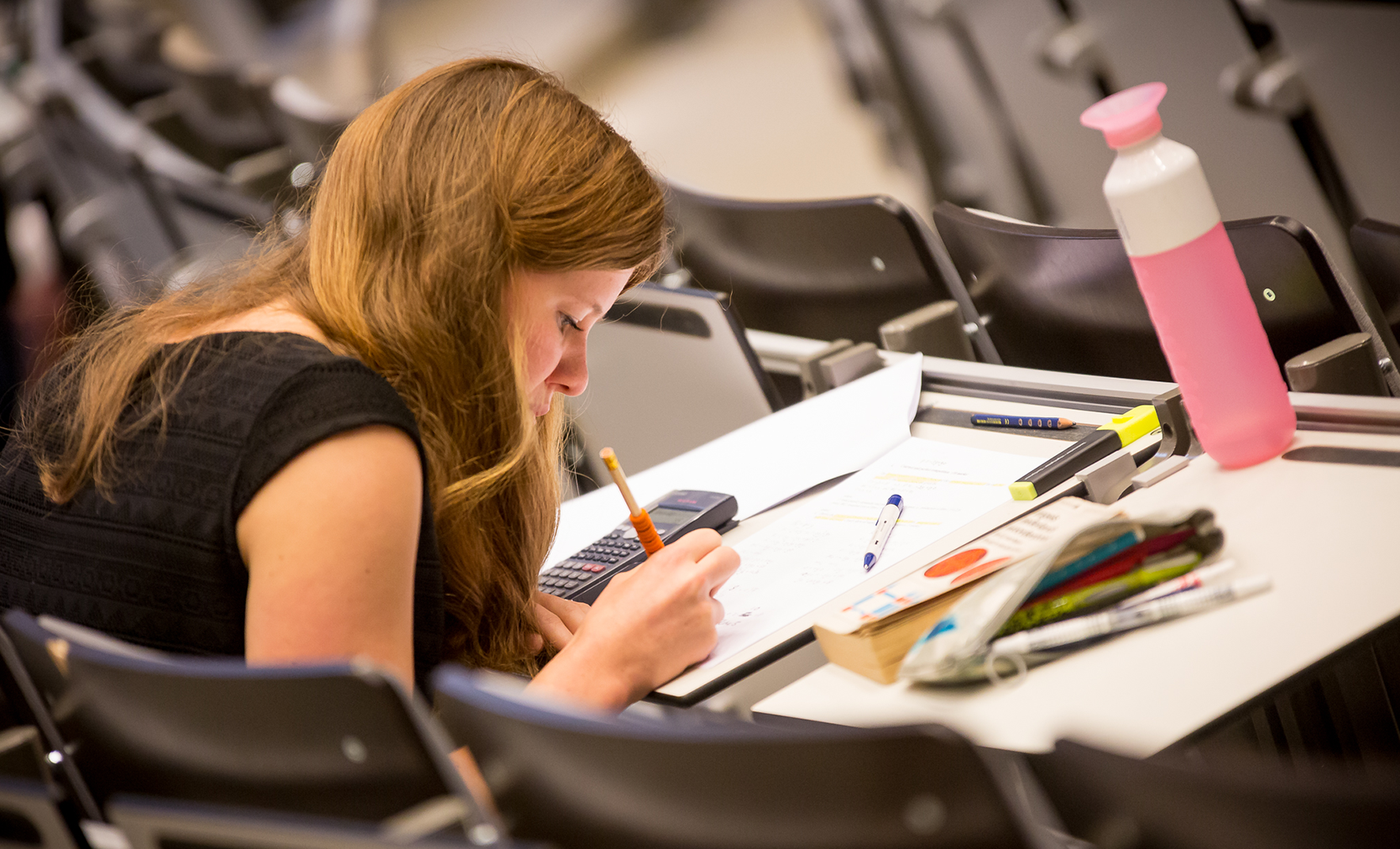After years at the helm of teaching at Wageningen, Arnold Bregt will be stepping down from his role as Dean of Education. He saw student numbers rise substantially and then fall again, he steered education through the Covid crisis and he helped shape the new resit policy.
Just a few more weeks and he will be done, but he doesn’t feel the job is finished. Arnold Bregt sees plenty of challenges in education for his successor to deal with. He would secretly be quite happy to continue a little longer, giving ‘strategic advice’ to the Executive Board and making sure the Wageningen teaching machine functions smoothly. ‘The nice thing about this job is you never do it alone: you need everyone else. If you want to introduce a change, you do it with the teachers, students, policy officers and support staff. I enjoy playing a role in such complex group processes.’
What was the education situation when you started eight years ago?
‘Student numbers were shooting up. We went from 9,000 students to 13,000 in just a few years. That put a lot of pressure on the system because the growth in staff hadn’t kept pace. Teachers had huge workloads and there physically wasn’t enough space. Our challenge was to teach all those extra students and still maintain Wageningen’s high quality. We invested in new accommodation, such as the Aurora building, and hired a lot of teachers and researchers. The ratio of students to staff when I started was 18:1, compared to 14:1 now. That makes a real difference to teachers.’
Now it looks as if fewer students are coming to Wageningen.
‘That’s true, we’re seeing the reverse. The influx of Dutch school leavers is falling, Dutch politicians are voicing concerns about the number of international students and there is increasing competition from other universities. In the past, you had to go to Wageningen to study certain subjects. That has changed. Other universities now also recognize the importance of our domain and are offering similar degrees.
As WUR, we need to promote ourselves more among school leavers
That recognition is nice, but we need to make sure we don’t become invisible. Our forecasts assumed a slight downward trend in the intake. Perhaps we didn’t take action fast enough because there are worries that numbers might be falling too quickly. As WUR, we need to be far more active in promoting ourselves among prospective students. We have been voted the best university in the Netherlands by students for 20 years now — we need to publicize that more often and more vociferously.’
To what extent has the education on offer at Wageningen been revamped?
‘Five new degree programmes have been added. We now have a Bachelor’s in Marine Sciences and will soon have Data Science for Global Challenges. The new Masters’ are Biobased Sciences, Data Science for Food and Health, and MADE – Metropolitan Analysis, Design and Engineering – in partnership with Delft University of Technology.
‘We have also started teaching seven Bachelor’s programmes in English. We were quite late in taking that step in Wageningen. Looking back, that’s not a bad thing as we will probably not be hit so hard by the proposed Balanced Internationalization law (in which the Dutch government is aiming to steer the internationalization of higher education in the desired direction, in part by taking a critical look at which degrees should be offered in English, ed.). That’s what I hope, at any rate.
‘We offer an ever-wider range of educational approaches, both extracurricular and in the curriculum. The student challenges are an example of extracurricular education that lots of students get involved in. There have also been educational improvements “behind the scenes”. Six years ago, the accreditation organization NVAO was critical of our examining boards. While that’s not something students and teachers notice, these boards are crucial to the recognized value of our degree certificates. All the degree programmes were reviewed again last year and this time the examining boards got a lot of praise.
‘Now, we carry out a portfolio analysis every three years to make sure we are continually critically assessing the education we offer. We’ve become more professional in this respect too.’
What has changed most in the past few years?
‘We have become much more of a Master’s university: Master’s students currently make up two thirds of our student population. In the wider world, the tone of the political debate has changed. People are more distrustful of higher education institutions, which are sometimes portrayed as elitist. That’s a dangerous development. We need to maintain and strengthen our connection with society. We are already doing that but we need to stay alert.’
How do you feel about the pandemic period?
‘Covid had a huge impact on education. What I remember above all is the dedication of our teaching staff: in a single weekend, they made a huge transition to an online environment so that they could continue teaching. At the same time, Covid showed how important in-person education is — the interaction and the spontaneity you get from being together in a classroom. Another positive aspect is the greater awareness during that period of students’ mental wellbeing.’
After the pandemic, the resit policy was a tricky issue. In the end, the number of times a student can sit an exam in a given year was reduced from three to two.
‘Students were critical and not keen on losing one resit possibility. I don’t mind people being critical — that helps refine the decision-making and improves the quality of the decisions. After a lengthy process and lots of discussions with students and teaching staff, we ended up with a balanced policy that left both groups better off.
What I remember above all from the pandemic is the dedication of our teaching staff
Teachers have a reduced workload and students are taking their exams more seriously, with the pass rate for the first time they take an exam rising from 81 per cent to 89 per cent. It’s great when you have a tricky issue like that and eventually come up with a win-win solution.’
What would you say has not been a great success?
‘I think we could do more in terms of boundary crossing. We aim to educate students to be able to resolve complex problems in society. That requires an ability to collaborate across domains, disciplines and cultures. We are doing that already, but I think it could be much more. I sometimes say: education is evolution. And sometimes evolution is slower than you’d want.’
What has been a great success?
‘In addition to being Dean of Education, I also chaired the Recognition & Rewards working group. That was another difficult process that took over four years, but the end result was good. In contrast to the past, when academic staff were judged mostly on the number of publications and PhD candidates they supervised, now there is more recognition of teaching and impact on society.
Given the information explosion, a rethink is required: how do we keep education inspiring?
‘I’m also proud of how everyone involved in teaching has continued to offer high-quality, relevant education. Students, teachers, examining boards, the Executive Board, Education & Student Affairs, chair groups, programme directors and so on — they are people with their own roles and objectives, but they depend on one another. Together, we can keep the education machine progressing step by step, perfecting it and adapting to developments in the market, in politics, technological advances such as generative AI, pandemics and so forth. We’re doing a good job there.’
What problems will your successor need to tackle?
‘We need to make cuts and I suspect funding will stay tight in future too, in part because the world is changing. The information explosion — with everyone being able to look up anything on YouTube or ChatGPT — means students will be less interested in a classical format where the teacher stands in front of the class and tells them things. That requires a rethink. How do we keep education inspiring?
‘We shouldn’t underestimate the extent to which AI is undermining the traditional cornerstones of education. Students are currently assessed for writing an essay or thesis. But what do you do if students can outsource some or all of that assessment work to ChatGPT? I like technology and don’t necessarily see this development as a threat, but what does it mean for the next generation of students and the education we want to give them?’
What advice would you give your successor?
‘You can set a lot of things in motion in this job, but you have to accept it will happen slowly. Education is like an oil tanker: it takes patience and perseverance to change course.’
Finally, what are your plans for after you’ve handed over to the next person?
‘I work one day a week in the Geo-information Science chair group, but I haven’t given that task so much attention over the past few years, so I will be spending more time there. Apart from that, I don’t know exactly. At any rate, I plan to have more granddad days with my granddaughter Pippa in Breda.’

 ‘I like the way we can all work together to keep perfecting the education machine and adapting it to developments in the market, in politics, technological advances such as generative AI, pandemics and so forth. We’re doing that well.’ Photo Duncan de Fey
‘I like the way we can all work together to keep perfecting the education machine and adapting it to developments in the market, in politics, technological advances such as generative AI, pandemics and so forth. We’re doing that well.’ Photo Duncan de Fey 

